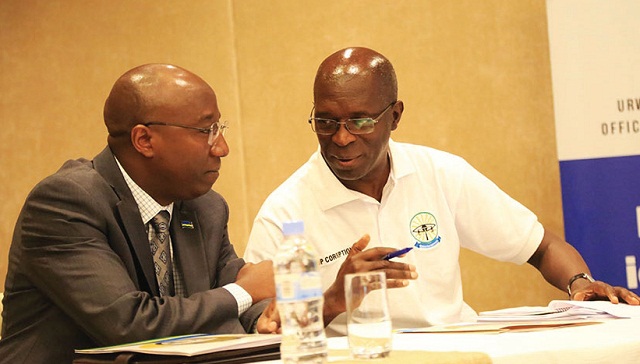
Kampala, Uganda | THE INDEPENDENT | Rwanda is renowned world-over for its tough and successful anti-corruption management. But to mark this year’s International Anti-Corruption Day on December 08, the government renewed its call to itizens to break the silence on the still lingering pockets of graft in the country.
Speaking at an event to mark the anti-corruption day in the Rwandan capital Kigali, Rwandan Prime Minister Edouard Ngirente, acknowledged that graft is still prevalent in the country, despite positive ratings by some global and corruption watchdogs.
There are some institutions where it remains prevalent, he said, adding that the silence of victims presents another challenge in graft fight.
“We are yet to get where we want to be; there are some institutions where it is not too much,” he said, “There is a large number of people who are reluctant to report corruption.”
This should change, said Ngirente, urging the public to act as whistle blowers.
“All Rwandans should provide information about corruption so that the parties involved are punished as it is government’s priority to fight corruption,” he said.
The PM named institutions such as advisory councils at national, districts, sector, and cell level as those that should become more involved in fighting corruption. He said their programmes must include fighting corruption since it is provided for by laws. He said they must be the foundation for fighting corruption.
The PM also said the Ombudsman’s Office will be empowered with increased capability to monitor and coordinate activities aimed at fighting graft in all government institutions. He said this is part of the government’s effort to empower selected bodies with skills in criminal investigations and prosecution of corruption.
He said since research shows that averagely 10% of each country’s national budgets worldwide is lost through corruption, it is important that it is fought on all fronts if Rwanda is to develop at an even great pace than the present.
Individuals and institutions in the private sector are known to sometimes opt to corrupt government officials to win either competitive tenders or ensure they are paid faster for their supplies of goods and services to the government, according to Rwandan Ombudsman Anastase Murekezi.
“This is issue is no longer a secret,” he said, “We need to prevent corruption first, starting from our values.”
He advised against illegal accumulation of ill-gotten wealth.
Rwanda has very stringent punishments for anyone implicated in corruption; and more are planned for early next year for financial and economic crimes, and corruption related charges remain under investigation for as long as is necessary to dispose of them. There are also calls for added effort and resources in enforcement.
The corruption Perception Index released by Transparency International this January placed Rwanda, alongside Mauritius, as the third least corrupt country in sub-Saharan Africa. The 2017 East African Bribery Index, meanwhile, ranked Rwanda 5th among Sub-Saharan countries that invest most in fighting corruption.
The Rwanda Bribe Index released last June by the same watchdog shows that only 15 percent of the people who are asked to pay bribe report it.
The report released in June showed that organisations in the utility sectors; water and electricity recorded the highest incidences of corruption at 18.1% from a low of 2.5% three years ago. Police was the third worst performer at 15%, local authorities 5.4%, judiciary 5.1%, education 3.5%, tax agencies 3.0%. The medical and health services are the least corrupt with incidence of 0.5%.
The General Assembly of the United Nations designated 9 December as International Anti-Corruption Day to raise awareness of corruption and of the role of the Convention in combating and preventing it. The day is intended to enable governments and citizens around the World to evaluate and compare their effort and outcomes in fighting corruption as it continues to undermine the economies in many countries.
Every year 1 trillion U.S. dollars is paid in bribes while an estimated 2.6 trillion dollars are stolen annually through corruption, a sum equivalent to more than 5 percent of the global GDP, according to the United Nations.
In developing countries, funds lost to corruption are estimated at 10 times the amount of official development assistance, according to the United Nations Development Programme.
 The Independent Uganda: You get the Truth we Pay the Price
The Independent Uganda: You get the Truth we Pay the Price



